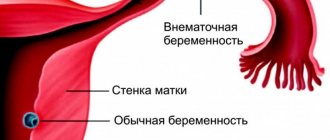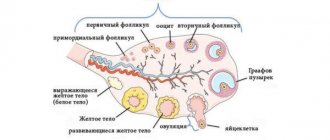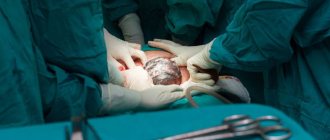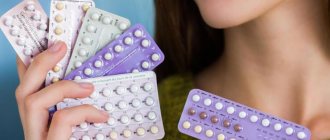Could there be early ovulation? This is a common question. Let's look at it in more detail.
The most important task of the female body is considered to be procreation and childbearing. And a process such as ovulation is responsible for this important function. But sometimes unexpected disruptions can occur when ovulation occurs earlier than expected.
The egg is usually supposed to be released from the ovary in the middle of the menstrual cycle. But this may happen ahead of schedule.
Is early ovulation possible with a 28-day cycle?
It is believed that with a cycle of 28 days, a mature reproductive cell is released on the 14th day. This is exactly what happens to many women. However, there are also cases in which ovulation in a 28-day cycle occurs on the 12th day and maybe even earlier.
Women with such cyclic pathology have a fairly short follicular phase, that is, the time from the beginning of menstruation to the release of the egg from the ovaries. Usually its duration is about 12-15 days. During this phase, the egg is protected by a follicle in which it matures and grows.
If the follicular phase lasts less than 12 days, early ovulation occurs and the chances of getting pregnant are too low. In this case, the egg has not yet fully developed and matured, and therefore is not ready for fertilization.
On what day can you get pregnant?
A modern educated woman knows that you can get pregnant on any day of the cycle, provided that ovulation occurs. And it can appear at the beginning of the cycle, at the end, on critical days. It's all about hormonal levels and factors that affect a woman's body. Theoretical calculation is based on approximate data. If the cycle is irregular, its average value should be calculated. It is necessary to add up the entire duration over six months, a year. Divide by 6 or 12. For example, 26+28+30+25+32+35 = 176, divide by 6 = 29. The resulting duration is 29. From this number you need to subtract 14. It turns out that on the 15th day the egg is released from the follicle . But everything is approximate.
The following calculation method suggests taking days with a reserve. A woman must subtract 17 days from her shortest monthly period and 11 days from her longest period. It turns out to be a period of days favorable for conception. 25–17 = 8; 35–11 = 24. From 8 to 24 days you can get pregnant.
If a woman has regular periods, days favorable for conception are much easier to determine. This is 5 days before the ovulation period and 2 days after it. Although the egg is capable of fertilization for only 24 hours, or even less, the viability of the sperm is also taken into account. They remain active for about a week on average. That is, sexual intercourse a week before the release of the egg can cause pregnancy.
Can a similar condition occur normally?
This can happen to every woman. But if such premature rupture of the follicle occurs constantly, this can cause infertility.
On what day of the cycle does early ovulation occur?
Ovulation occurs earlier than the 12th day after the start of menstruation. The egg is ready for fertilization in 12-16 days with a 25-day cycle.
Consequences of premature ovulation
Unplanned pregnancy is the main result of the disorder in women using calendar-based contraception. The bad thing about this method is that girls make mistakes in determining safe days.
Thinking that it is a safe time, partners have unprotected sex, and as a result, fertilization occurs. If implantation bleeding appears, the girl thinks that another menstruation has arrived, although the discharge is more scanty. The pregnancy is growing, and if she decides to have an abortion, curettage will damage the endometrium, which threatens infertility.
In the opposite situation, the family cannot conceive a baby for several cycles. A couple is trying to have a child on days when the fusion of germ cells is impossible: the oocyte has matured before the expected time. Having identified the pathology and undergoing treatment, they will be able to find the long-awaited child.
Sometimes the early release of the female gamete from the ovary indicates disorders in the sexual sphere and is dangerous for infertility. An immature oocyte cannot be fertilized and pregnancy does not occur. Having noticed that ovulation occurs prematurely for several months in a row, a woman should immediately consult a gynecologist.
Causes
The main reasons for early ovulation:
- short follicular phase;
- stress;
- alcohol and caffeine abuse;
- sudden weight loss or weight gain;
- time before the onset of menopause;
- sexually transmitted diseases;
- discontinuation of oral contraceptives;
- irregular menstrual cycle, which could be caused by gynecological hormonal diseases;
- sudden changes in normal daily activities.
Any hormonal disturbances can affect the staging and duration of the menstrual cycle. The egg in the ovarian follicle matures thanks to follicle-stimulating hormones (FSH), and release occurs due to the action of luteinizing hormones (LH). All these substances are produced under the control of the hypothalamus in the pituitary gland. If the level of these hormones changes, this will lead to disturbances in the ovulatory mechanism. This is why early ovulation occurs.
Premature onset of the ovulatory phase is associated with elevated FSH levels.
Ovarian activity inevitably declines with age. A girl at birth has about two million eggs. During the menstrual cycle, hundreds of eggs die and only one matures. There are exceptions when more than one egg can mature in one cycle - this is hyperovulation.
The reasons for early ovulation should be determined by a doctor.
By the age of 30, a woman loses more than 90% of her eggs. And the closer the onset of menopause, the faster the pituitary gland begins to feedback and releases more and more FSH to compensate for the lack of ovulating follicles. All this will ultimately lead to menstrual irregularities.
The results of constant early ovulation are the appearance of immature eggs and infertility.
Research shows that smoking can disrupt the ovulatory cycle and affect female fertility. If a woman smokes more than 20 cigarettes a day, then the full maturation of the egg is impossible. The same can be said about the effects of caffeine and alcohol.
Signs and symptoms
In order to detect premature release of an egg, you need to monitor the cycle for at least three months. Ovulation should be expected on days 12-16 in a 28-day cycle, and in a 30-day cycle it should be expected on days 13-17.
If a woman begins to feel these signs soon after her menstruation, then most likely her ovulatory phase occurred earlier than usual:
- soreness in the mammary glands;
- aching pain in the abdomen;
- high viscosity of cervical mucus;
- increased sexual desire.
These signs of early ovulation can be detected by measuring LH levels in urine using ovulation tests.
How does RO manifest itself and can it be determined?
The signs of early ovulation are identical to those characteristic of normal, timely maturation of the egg:
- change in the nature of vaginal discharge - cervical secretion becomes more viscous and viscous, and in appearance it resembles egg white;
- nagging pain in the lower abdomen;
- sudden mood changes;
- swelling of the mammary glands and increased sensitivity;
- increased sexual libido.
As for determining the onset of RO, its onset can be diagnosed using one of the following methods:
- changes in basal temperature;
- using special tests;
- ultrasonography.
How can you detect ovulation?
The most reliable sign of the appearance of an egg is the establishment of a peak basal temperature, which is available to every woman at home. Although this method has its drawbacks: it is necessary to adhere to the measurement procedure for at least six months, record the results, build graphs and analyze it together with a gynecologist.
The most accurate way to determine the date of release of the egg is to measure the diameter of the follicle using ultrasound (folliculometry). But such a measurement, for obvious reasons, is not available to all women.
A very informative way that you can do at home is to use ovulation tests. If the egg appears prematurely, it is best to use reusable cassette devices, devices for determining ovulation by saliva, or purchase many disposable test strips and start using them immediately after the end of your period.
If such a failure happened only once, then there is no need to worry. Problems with conception may appear if this pathological condition persists for more than three months. At the same time, the menstrual cycle will shorten and your period will come earlier than expected.
Methods for calculating ovulation
You can calculate the ovulatory period using various methods. For example, the most accessible and most reliable method is the use of test strips. This method is most suitable for patients with regular cycles. If menstruation comes at different times, it is difficult to roughly predict the days of ovulation. Such tests are quite expensive, so it is impossible to carry them out every day. But if financial solvency allows, then during daily testing on certain days you can see two bright stripes. When they are as bright as possible on the test, then ovulation has occurred.
If the cycle is irregular, then it is better to use basal measurements, which must be carried out over several months. Then, by comparing the graphs, you can determine whether the ovulatory period may occur prematurely, or whether it comes later than usual. The temperature is measured at one time, in the morning. You cannot get out of bed; prepare the thermometer in the evening, shaking it in advance.
Ultrasound diagnostics is also considered a reliable method, which allows monitoring the process of follicular maturation. It is better to carry out the examination vaginally, starting from the seventh day of the cycle, repeating the procedure every two days.
Pregnancy with early ovulation
Pregnancy is definitely possible, but this probability will be much less than with normal ovulation. During the early ovulatory process, the egg leaves the follicle immature. It may not develop further and may not become fertilized. Such an egg attaches itself to the wall of the uterus with great difficulty, and even then the pregnancy that seems to have occurred can be terminated at an early stage.
Premature ovulation is a sign of decreased ovarian reserve capacity. And the lower they are due to the woman’s illnesses or age, the earlier the appearance of the egg from the follicle occurs.
How are early ovulation and pregnancy related?
An ovulation test that is done early in pregnancy may show the amount of hCG instead of the LH level (since these hormones have a similar chemical structure) and therefore will give false information about early rupture of the follicle and the absence of pregnancy.
Another obstacle to pregnancy can be the early release of an egg during a long cycle, when a woman waits for ovulation in the middle of the cycle, and the appearance of a mature cell has already occurred long ago, due to which attempts to get pregnant are unsuccessful.
It happens quite often that the cycle goes wrong after a pregnancy is terminated. Therefore, it is necessary to wait another full cycle for ovulatory function to be restored again.
For most women who have had a miscarriage, ovulation always occurs earlier than usual, which leads to infertility. The cause may be stress or hormonal imbalance. In such cases, you should consult a doctor.
When should the body be “tested” during late ovulation?
Those who are seriously planning a child and also want to guess the month of his birth should carefully calculate the key points of the cycle. The table below will help you determine when late ovulation occurs and when the test shows pregnancy. It indicates the timing of tests for luteinizing hormone (ovulation) and hCG (pregnancy) for cycles of different lengths. All numbers indicate the day from the beginning of the last menstruation.
If the cycle length you calculated differs from the examples given, you should take the closest one and subtract or add the number of days by which they differ.
Treatment
Numerous infertility problems in most women were caused by ovulation disorders. Therefore, it is important to consult a doctor before starting treatment and examine your hormonal levels.
First of all, you should give up bad habits (alcohol, smoking, caffeine). You also need to sleep in complete darkness. This can help restore FSH levels, which are responsible for the initial phase of the cycle. In this way, the normal cycle is consolidated and regulated, which will then facilitate conception and implantation of the embryo.
Medicines
Drug treatment includes drugs that help stimulate the maturation of eggs and their timely release - LH and FSH (Cytorotide). They are administered subcutaneously, starting from the initial days of the cycle until the period of normal ovulation. Taking such drugs on your own is strictly prohibited.
Also, glucocorticoids are often recommended to restore ovulation, mainly against the background of hyperandrogenism. You should not suddenly stop taking these medications. In these cases, premature ovulation may occur due to Prednisolone, Metipred and other glucocorticoid drugs. Only a doctor can carry out the withdrawal of these drugs according to a certain scheme.
If a woman often experiences early ovulation on the eighth day of her cycle or a little later, she should consult a doctor. This is especially important if she has a short menstrual cycle - 24 days, because in this case the ability to conceive is sharply reduced.
How to normalize the ovulatory cycle
It is impossible to normalize the timing of ovulation on your own. Before deciding on the direction of therapy, it is necessary to find out why this problem occurs. If a woman consistently ovulates 5 or more days before the normal period, this condition requires diagnosis and treatment. Often the problem goes away if it is possible to eliminate the problems in the functioning of the organs that caused early ovulation.
If the problem is caused by hormonal disorders, the course of treatment consists of therapy with drugs containing hormones. Medicines are often injected into the abdominal area. During treatment, constant medical monitoring of the level of hormones in the blood is necessary.
Women who experience premature follicle maturation require the following preventive measures:
- compliance with the work and rest regime;
- minimizing stressful situations;
- quitting smoking and limiting alcohol consumption;
- strengthening the immune system;
- taking vitamin complexes;
- balanced diet.
Early ovulation can be observed in any woman, both with a short and a long cycle. If this phenomenon is episodic, then, as a rule, it does not require drug treatment. Constant premature maturation of the follicle makes it necessary to consult a doctor to determine its causes and correct the cycle. Early ovulation does not exclude conception, which should be remembered by women for whom this is not desirable. If the birth of a child is planned, then you need to remember that the premature release of the egg into the abdominal cavity will not become an unavoidable obstacle. With proper treatment and prevention, pregnancy will definitely occur!
Dietary supplements
Often women, in order to restore hormonal levels, for example, with early ovarian depletion, take a variety of dietary supplements. The effect of these drugs on hormone levels has not been established. Therefore, it is impossible to say for sure whether early ovulation can occur from taking Ovariamin and similar drugs.
It is quite difficult to restore normal ovulation on your own; it is difficult to influence it on your own. Therefore, most treatment recommendations boil down to restoring the functions of the neurohumoral system and general health promotion. This should help restore hormonal levels in a healthy woman.
Taking Duphaston progestogens will help support an already established pregnancy and stabilize the second phase of the cycle. Gestagens do not affect the first half of this period and cannot cause early ovulation. The same can be said about the popular drug “Utrozhestan”.
We looked at what day early ovulation occurs.











